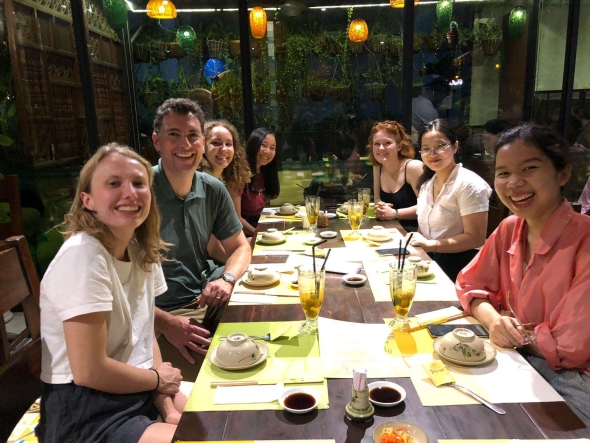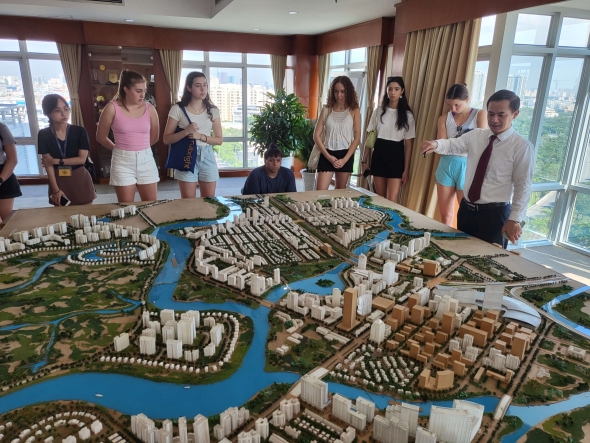
- Undergraduate
- Research
- Foreign Study
- Inclusivity
- News & Events
- People
Back to Top Nav
Back to Top Nav
As part of a new Fall Term Plus program led by Associate Professor of History Edward Miller, students researched aspects of development in contemporary Vietnam and created short films.
In 1975, when North Vietnamese Army tanks rolled into Saigon, effectively ending the deadly conflict with South Vietnam, villages, cities, and farmland were decimated. As many as 2 million civilians lost their lives in the war, along with some 1.1 million North Vietnamese and Viet Cong fighters, plus 250,000 South Vietnamese soldiers. Prospects for swift, sustainable economic recovery seemed dim.
Yet, over the past four decades, boosted by international investment, the Socialist Republic of Vietnam has reinvented itself as a development success story. How was this success achieved, and at what costs? Who has reaped the benefits, and who has missed out?
Associate Professor of History Edward Miller, who co-founded an oral history program called the Dartmouth Vietnam Project and served as an adviser on Ken Burns and Lynn Novick's' PBS series on Vietnam, says those questions are what make the region ripe for field study.
In collaboration with Fulbright University Vietnam, a start-up liberal arts university in Ho Chi Minh City, Miller created an intensive, interdisciplinary, and immersive experience called Developing Vietnam. Offered by the Asian Societies, Languages, and Cultures Program, the Fall Term Plus program explores the social, economic, and environmental changes that have transformed the country since the 1980s, incorporating research methods and perspectives from history, environmental studies, and film and literary studies.
Preparing for the Journey
Before they conduct field research in Southeast Asia, Miller's students—there were 19 last fall—take a full-credit course, embarking on projects to be completed and presented during the three weeks they spend in Vietnam during the "winterim" between fall and winter terms.
"They get a solid grounding in contemporary Vietnamese politics, society, and culture, with a focus on how contemporary development has unfolded since the end of the Vietnam War," Miller says. "And that's when our students begin their collaboration with Vietnamese students at Fulbright University Vietnam."
With Nguyen Nam, who directs Fulbright's Vietnam Studies Center, and Lan Nguyen, a PhD candidate in the Ecology, Evolution, Environment, and Society Program at the Guarini School of Graduate and Advanced Studies, Miller built the course around three broad interdisciplinary perspectives on development: history, environmental studies, and culture and literature.
The itinerary included Bến Tre Province in the Mekong Delta, the Cần Giờ Mangrove Biosphere Reserve, and various sites in Ho Chi Minh City. Students also spent time on a farm outside the city, which was renamed from Saigon after the war and now has a population of about 9 million.

Miller says Vietnam's postwar development can be viewed through three distinct interpretive lenses.
"There's the celebratory model of development: the notion that development is a manifestation of human progress, and things are just getting better and better," he says. "Then there's the critique of that view, holding that modernity is just a continuation of capitalist and colonialist oppression. But the one we emphasize in the course is called the historicist model, where you have to look at development in the particular historical context in which it unfolds."
Growth creates all kinds of problems, says Miller.
"One is economic inequality, and another is the struggle with infrastructure, especially in places like Hanoi and Ho Chi Minh City. And it doesn't lead to political liberalization. The Communist Party is still very much in charge in Vietnam, and they are not interested in sharing power with anybody. Those are some of the issues that we wrestle with in this course."
Eye-Opening Fieldwork
In addition to writing research papers, teams of students made six videos based on comprehensive fieldwork. Among them is The Ba Lai Dam, produced by Phoebe Altman '24, Nadine Lorini Formiga, Nguyễn Minh Huyền, Nguyễn Hà Mỹ Tâm, Katya Pronichenko '23, and Kate Yeo '25.
The project explores how the dam, built to keep salt water from intruding into local farmland, has both positive and negative impacts on agriculture, says Yeo, an environmental studies major from Singapore.
"A lot of literature I've read on dams is pretty negative, and that did correlate with a lot of what we found, especially for downstream farmers," she says. "There's a lot of flooding because they have no control over how much water is released. But upstream farmers actually benefit a lot because the dam was constructed primarily to manage or stop saltwater intrusion, and with climate change, this dam has become very important in helping farmers to access fresh water. A big part of our research was finding this huge inequality between upstream and downstream farmers."
The Ba Lai Dam is just one example of the way Vietnam's economic development is bringing prosperity to some, but not to others, says Altman, an environmental studies major whose family owns a farm in the Hudson Valley.
"In Vietnam, we could really see the intersection of government policy, international markets and investment companies, and the environmental impacts of all of these different kinds of development," she says.

Altman was visibly struck by the breakneck speed of postwar development.
"Where we stayed, in district seven of Ho Cho Minh City, everything was essentially built, designed, and constructed within the last 20 years. This is all happening very rapidly in Vietnam."
Both the on-campus course and the off-campus field study were intensive and rewarding, says Katya Pronichenko '23, who has a major in geography and a minor in environmental studies. Her parents emigrated from Russia, and when they visited her in Vietnam, she says their perspective on the past further deepened her understanding of the issues in play today.
"I love the interdisciplinary experience in which you get to collaborate with students from another country," she says. "Our teams got to meet students from Fulbright University Vietnam who have completely different life experiences from ours. And we all have different life experiences too: Kate's from Singapore, Phoebe's from upstate New York, and I'm from Los Angeles. So you learn a lot, not only from the material, but also from each other."
Sifting Fact from Fiction
During 13 weeks of close study and observation, Miller says students have seen Vietnam's transformation through multiple viewpoints. "For example, in Ho Chi Minh City, we watched an animation telling the story of how the city used to be an unproductive wasteland, where nobody lived. And then it's shown to be a shining example of development, with malls and curated landscapes and modern architecture."
That turned out to be a highly misleading narrative, says Miller.
In 2025, Miller notes, the world will mark the 50th anniversary of the end of the war.
"There will be a huge amount of media coverage around that, and the students who do this program will be prepared to think a lot more critically about some of the problematic development narratives that have been—and will be—publicized."